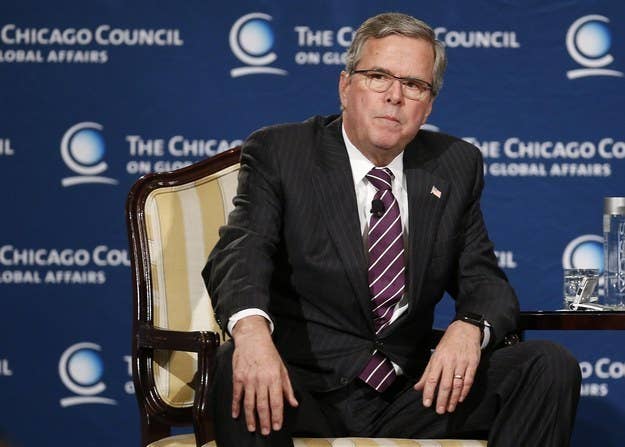
CHICAGO — "I am my own man," Jeb Bush declared on Wednesday, making a conscious effort to create the appearance of distance between his and his brother's foreign policy.
But in his first major foreign policy-related address as a likely presidential candidate, Bush was vague on many of the topics of the day, and appeared to generally embrace the foreign policy legacies of George W. Bush and George H.W Bush's presidencies, while offering clues as to how he'll stack up against other Republican primary candidates on these issues.
In a question-and-answer session after his speech to the Chicago Council on Global Affairs, Bush criticized some aspects of the Iraq War, pointing out that claims that Saddam Hussein's regime had weapons of mass destruction "turned out not to be accurate" and that "not creating an environment of security after taking out Hussein was a mistake." But he praised the surge, calling it "one of the most heroic acts of courage politically that any president's done" and "hugely successful."
Bush read his address from notes on the podium in front of him and raced through his speech so fast that there were no pauses for the mostly silent audience at the Fairmont Hotel to applaud, though he loosened up and seemed more comfortable during the question-and-answer session. He acknowledged up front that the legacy of his brother and father's tenure as president is something he'll have to contend with as a candidate.
"Just for the record, I love my brother, love my dad, and love my mother as well, if that's okay," Bush said. "I'm my own man and views are shaped by my own thinking and my own experiences."
But Bush stayed vague on some of the most pressing foreign policy issues of the day, and proposed few actual policy changes. He flubbed the number of ISIS fighters, saying in his speech that it was more than 200,000. (A Bush spokesperson told BuzzFeed News that he "misspoke" and "meant more than 20,000"). The CIA estimated in September that the real number of ISIS fighters is between 20,000 and 31,500. On ISIS in general, Bush had no real policy proposals, saying simply that the U.S. needs to "take them out."
"It's violent extreme Islamic terrorism," Bush said "The more we try to ignore that reality the less likely it is that we'll develop appropriate strategy to garner the support of the Muslim world, to like I said, tighten the noose and take them out."
He didn't seem totally firm on aspects of Russia policy, at one point praising Obama for a "forward lean" in the Baltics, then saying he wasn't sure if it had been implemented but was "assuming that it has been implemented." Bush criticized the Obama administration for not yet providing defensive weapons to the Ukrainians, calling the hesitation "feckless," and also expressed skepticism of the "reset" with Russia — a point on which, as a presidential candidate, he could attack Hillary Clinton, who was secretary of state during the attempted reset.
Bush seemed more comfortable when talking about Latin America, where he has personal experience; Bush holds a degree in Latin American studies, he resides in South Florida, and he and his wife lived in Venezuela for a while when he was a Texas Commerce Bank official. He also seemed more comfortable when he could talk about domestic policy, which he did frequently, even during the supposedly foreign policy-focused speech.
Although Bush is already behaving like the presumptive general election candidate, parts of his speech on Wednesday gave clues to how he'll stack up on foreign policy against the emerging Republican presidential field in the primaries next year. Bush appears to be defining himself to the right of potential candidates like Sen. Rand Paul, embracing a broadly interventionist view of U.S. foreign policy. On issues like Cuba, Bush was critical of the Obama administration's move to open relations with the country, sounding like potential rival Sen. Marco Rubio.
America's influence "has been a benefit to the world," Bush said, criticizing the Obama administration for being "inconsistent and indecisive."
Bush came out in favor of National Security Agency surveillance, saying "for the life of me I don't understand" why people have a problem with NSA metadata collection, and that the "debate has gotten off track." He called it a "hugely important program." This represents another area in which Bush is pitting himself against Paul.
And in Bush's choice of advisers, too, he seems to be hewing relatively closely to the legacy of his brother. Reuters obtained a list of some 20 people who will be providing foreign policy advice in some capacity to Bush; the list includes key George W. Bush administration figures like Stephen Hadley and Paul Wolfowitz.
